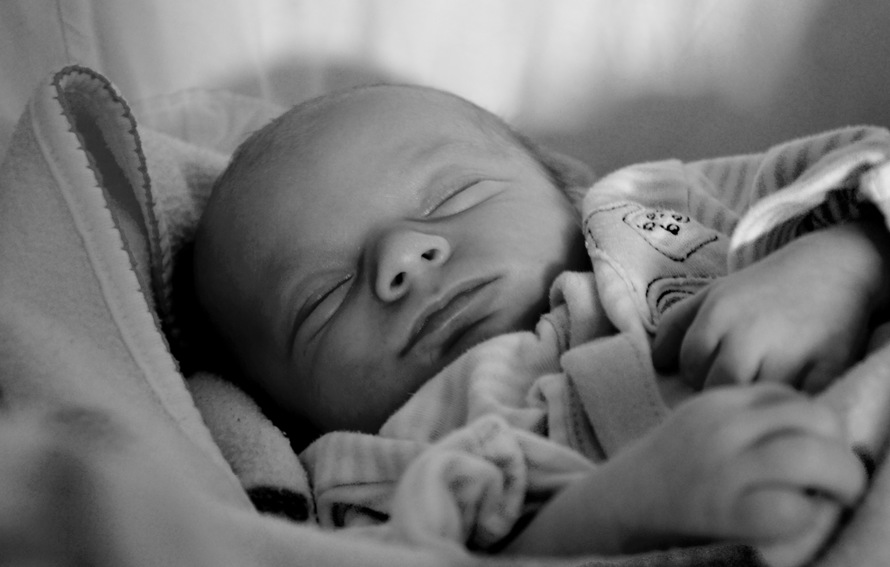Weeks 1 and 2
In the first two weeks of pregnancy, your body is preparing itself for fertilization. The first two week are the week of and the week after your last menstrual period and is the time when your uterus is beginning to prepare for the arrival of a fertilized egg. The fact that in the first weeks of your pregnancy you are technically not pregnant yet, means that it is quite difficult to directly pinpoint your due date. However it is still possible for your practitioner to accurately predict when your little one will arrive.
Weeks 3 and 4
This is when all the action happens! During weeks 3 and 4, ovulation is over and it is official, you have conceived. This means that the fertilized eggs has implanted into the uterus lining and has begun its wonderful journey from a single cell, into a beautiful baby girl or boy. At this point, the fertilized egg becomes a small ball of cells which will divide to become the embryo and the placenta.
Week 5
At week 5, the embryo is now the size of an orange seed and is roughly the shape of a tadpole. During this week, the circulatory system starts to develop, with the heart resembling two tiny channels, called heart tubes, which will eventually join together to form the heart. Other organs, such as the brain and spine, are beginning to develop this week too. Whilst the baby is growing, the hCG hormone levels in your body are now high enough to confirm on a home pregnancy test that you are pregnant – but it is best to seek confirmation from your doctor who will be also be able to figure out a due date.
Week 6
Whilst you may begin to get some of the symptoms we all recognised as related to pregnancy, your baby is beginning to develop their head and facial features. Other organs developing are the kidneys, liver, lungs and the heart is now beginning to beat at around 110 beats per minutes.
Week 7
During the seventh week of your pregnancy, your little one is about the size of a blueberry. At this stage, most of the growth is happening in the head, with new brain cells being generated at the rate of roughly 100 per minute. The arms and legs are also beginning to sprout and grow longer and dividing into hand, arm and shoulder segments as well as leg, knee and foot segments. Also developing are the mouth and tongue and the kidneys are fully developed.
Week 8
At this stage, the embryo is now the size of a raspberry. During this week, your little one’s heartbeat becomes much stronger, to about 150-170 beats per minute, and although you won’t be able to feel it just yet, your baby will begin to move around a little. At this week, you will also notice that your belly will be bigger as the amniotic fluid is increasing and the womb is expanding to accommodate the growing fetus.
Week 9
This is when the embryo starts to develop into a fetus and is now the size of a green olive. The head is becoming more developed and is beginning to look a lot like a baby. The vital organs continue to grow during this week and your baby’s heartbeat will now be audible on an ultrasound.
Week 10
Your baby is now a fully fledged fetus! Now, your baby is beginning to form bones and cartilage – especially in the legs and arms. Not only this, but your baby’s teeth are beginning to make an appearance under the gums. The digestive system is also developing rapidly and the kidneys are producing larger quantities of urine.
Week 11
By this week, your baby will have developed distinctive human characteristics, such as fully developed ears, open nasal passages, visible nipples and a tongue and palate in the mouth. Also developing in this week are the fingernail and toenail beds.
Week 12
At this stage, the task of developing the major structures of the body is nearly at its end. The next stage is for these systems to begin to mature over the next few months. The digestive system is beginning to flex its muscles and the bone marrow begins make white blood cells which will help baby to fight infection. You may also have a sonogram this week, and this is the perfect opportunity to hear baby’s heartbeat for the very first time!
Week 13
This is the last week of the first trimester and the fetus is now the size of a peach! During this week, your baby’s intestines make their way from a cavity in the umbilical cord (where they first began to develop) into their more permanent place in baby’s abdomen. Also developing is the placenta, which provides nutrients to baby, as well as their vocal cords.

